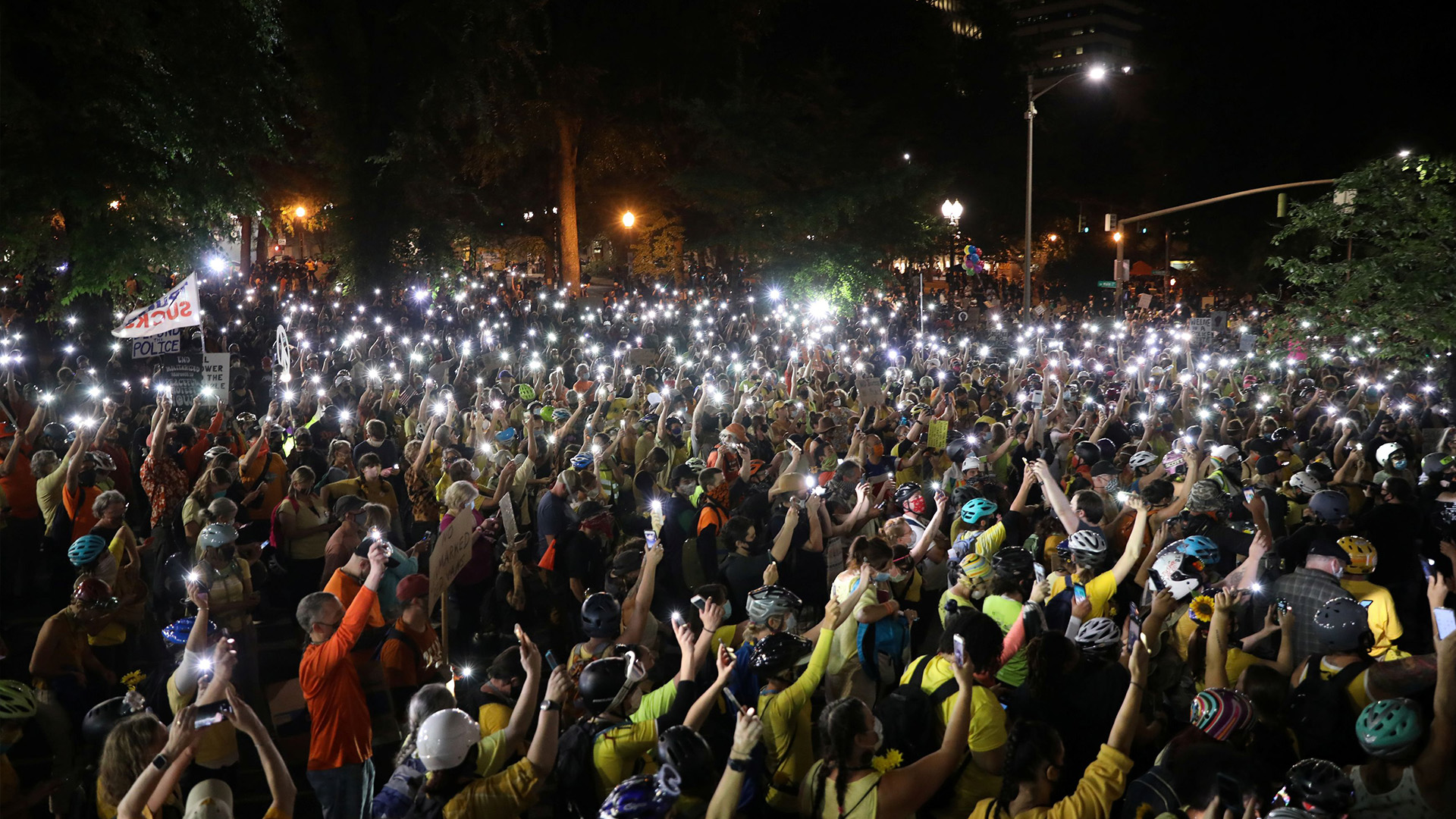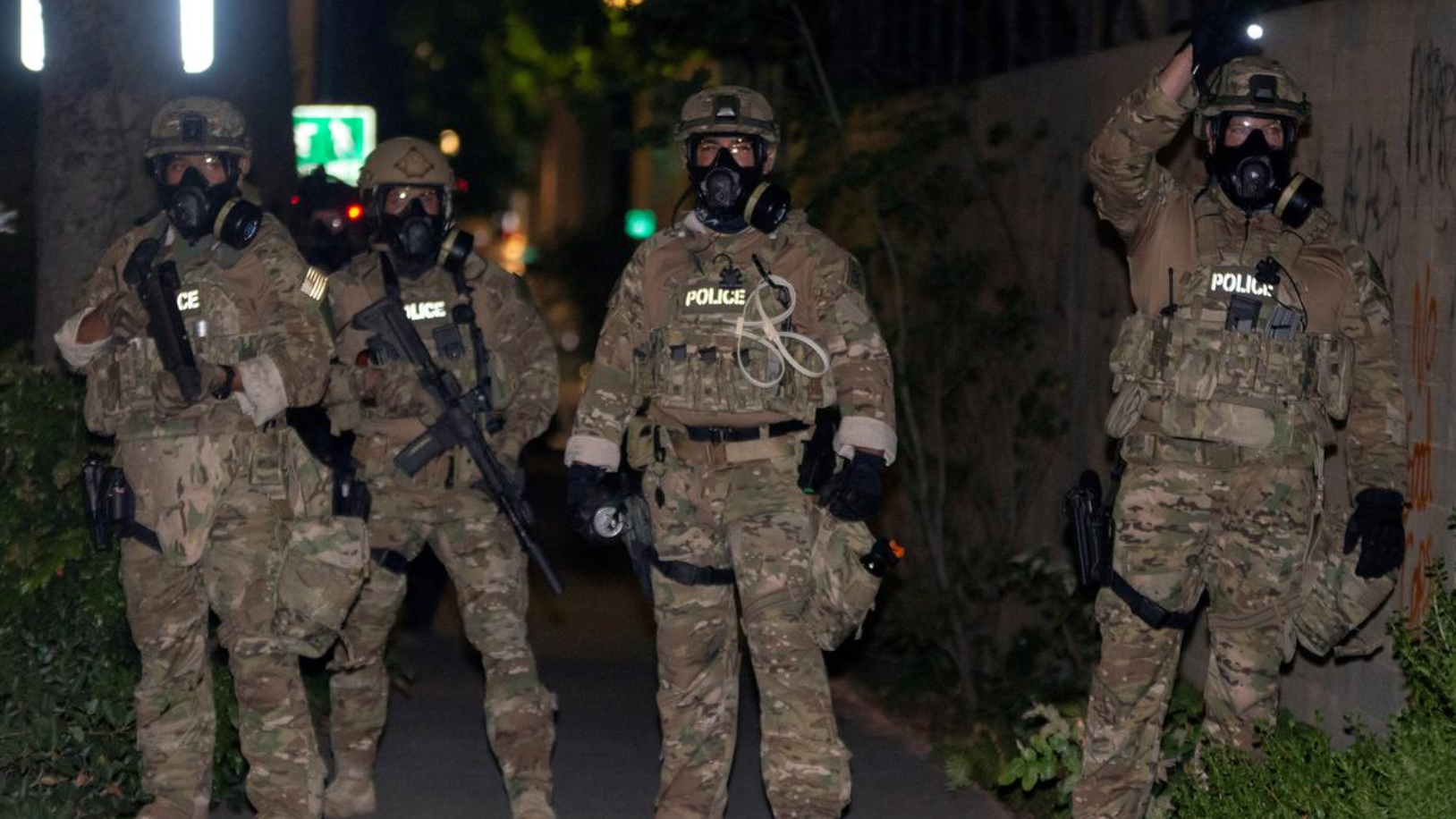01:29

The U.S. Department of Homeland Security's Customs and Border Protection arm confirmed on Tuesday it has deployed personnel from three paramilitary-style units to join a federal crackdown on protests against police violence in Portland, Oregon.
Multiple videos posted online showed camouflage-clad officers without clear identification badges using force and unmarked vehicles to transport arrested protesters, tactics that civil-rights advocates said could violate protesters' right to free speech under the First Amendment of the U.S. Constitution.
U.S. President Donald Trump, who has been sliding in opinion polls as he seeks re-election, has vowed to also send federal agents to cities including New York, Philadelphia and Chicago, which has sparked debate over the use of federal power as local and state officials, and many in the community, condemn their tactics and demand they leave.
Senator Ron Wyden, an Oregon Democrat, criticized the Trump administration's deployment of such forces.
"Donald Trump has no justification for deploying paramilitary troops to the streets of Portland or any other American city," Wyden said. "These occupying forces are creating conflict, attacking peaceful protesters and making my hometown more dangerous. For Portland to find peace, Trump needs to pull unwanted federal agents out of our city immediately."

Federal law enforcement officers face off with protesters against racial inequality in Portland, Oregon, July 17, 2020. /Reuters
Federal law enforcement officers face off with protesters against racial inequality in Portland, Oregon, July 17, 2020. /Reuters
What's going on in Portland?
Protests over the killing of George Floyd by police in Minneapolis have taken place in downtown Portland for more than 50 consecutive days, drawing at times more than 10,000 mostly peaceful demonstrators. A relatively small number of activists have vandalized downtown buildings, including the federal courthouse, and attacked police and federal agents.
Trump issued an executive order on June 26 to protect monuments and federal property after protesters tried to remove or destroy statues of people considered racist, including a failed attempt to pull down one of Andrew Jackson near the White House. The Department of Homeland Security dispatched agents to Portland as well as Seattle and Washington, D.C., starting around the Fourth of July weekend.
What happened after federal forces arrived?
Federal officers and protesters clashed in the streets outside the federal courthouse. Demonstrators broke windows and did other damage, hurled stones at the officers and shined lasers in their eyes. Agents fired tear gas to disperse demonstrators and have arrested about 43 people since July 4, mostly for minor offenses. Tensions escalated after an officer with the Marshals Service fired a less-lethal round at a protester's head on July 11, critically injuring him. They ratcheted up further when agents in unmarked vehicles with generic "police" patches on their camouflage uniforms arrested people at night without identifying themselves.
DHS officials defended the arrests Tuesday, saying they were carried out lawfully and intended to protect officers from violent crowds. They also noted it is routine to use unmarked vehicles. But it seemed to many like the U.S. had created a secret police force, and it drew lawsuits as well as more protesters into the streets.

Federal officers use crowd control munitions to disperse Black Lives Matter protesters outside the Mark O. Hatfield United States Courthouse in Portland, Oregon, July 21, 2020. /AP
Federal officers use crowd control munitions to disperse Black Lives Matter protesters outside the Mark O. Hatfield United States Courthouse in Portland, Oregon, July 21, 2020. /AP
Is it legal for federal forces to be used like this?
To a certain extent, it is legal. Federal law gives Acting Secretary of Homeland Security Chad Wolf power to deputize agents to protect federal properties, such as the federal courthouse in Portland, and the people there. But state and local officials say the federal agents have operated beyond their jurisdiction, and that has raised constitutional issues now being challenged in court.
As Michael Dorf, a constitutional law expert at Cornell University, said, "The idea that there's a threat to a federal courthouse and the federal authorities are going to swoop in and do whatever they want to do without any cooperation and coordination with state and local authorities is extraordinarily outside the context of a civil war."
Under the U.S. Constitution, state governors generally have authority to maintain order within their states' borders. That idea is reflected in the Posse Comitatus Act, which generally bars the federal military from participating in domestic law enforcement.
Another law, the Insurrection Act, lets presidents deploy U.S. forces to suppress domestic insurrection. However, Ohio State law professor Peter Shane said that law allows unilateral action when it is impracticable to otherwise enforce U.S. laws in court, or local authorities are depriving some people of equal protection. He said neither situation exists now, and Trump's references to Democratic-led cities "heightens the concern" he is depriving them of due process.
"The president is not the king," said Kent Greenfield, a Boston College law professor specializing in constitutional law. "The president does not have the ability to require states to enforce their laws in a certain way, or to elbow aside their law enforcement abilities."
Greenfield distinguished the current situation from 1957, when President Dwight Eisenhower sent army troops to stop violence over the integration of a high school in Little Rock, Arkansas, and 1962, when President John F. Kennedy sent federal agents to help integrate the University of Mississippi.
"Those were cases when a state was refusing to enforce federal law, or was hostile to enforcing it," he said. "You don't have open rebellion."
(With input from Reuters and AP)